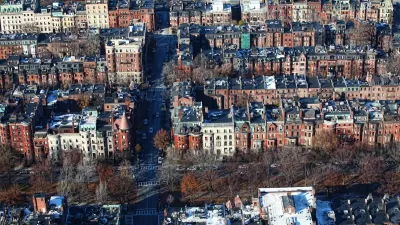Just because the public sector has set a goal to deliver thousands of new workforce housing units, doesn’t mean the market, or the private sector for that matter, will cooperate.

Michael Bodley examines the development market in Ashmont, where developers are struggling to make workforce housing projects pencil out.
The Ashmont section of Dorchester is newly popular, given its proximity to the Red Line. The neighborhood would also seem to be a perfect fit for helping Boston Mayor Martin J. Walsh achieve his target of building 53,000 new units by 2030. Yet developers like Peregrine Urban Initiative, which has approval "to build a $14 million, 64-unit apartment complex" in Ashmont but is finding it hard to justify offering new units below the market rate.
There is public funding available. The state's MassHousing recently rolled out a "new $100 million fund to support the construction of workforce housing," according to Bodley, which "provides a subsidy of up to $100,000 a unit, but comes with strings attached: One-fifth of the units must be affordable to tenants who make less than 80 percent of the area’s median income." But Peregrine says it would prefer to keep the project privately financed.
The article includes more details on the ongoing push and pull between the private and public sectors as they negotiate a middle ground of priorities.
FULL STORY: Newly popular Ashmont tests developers’ ability to finance workforce housing

Maui's Vacation Rental Debate Turns Ugly
Verbal attacks, misinformation campaigns and fistfights plague a high-stakes debate to convert thousands of vacation rentals into long-term housing.

Planetizen Federal Action Tracker
A weekly monitor of how Trump’s orders and actions are impacting planners and planning in America.

Chicago’s Ghost Rails
Just beneath the surface of the modern city lie the remnants of its expansive early 20th-century streetcar system.

Bend, Oregon Zoning Reforms Prioritize Small-Scale Housing
The city altered its zoning code to allow multi-family housing and eliminated parking mandates citywide.

Amtrak Cutting Jobs, Funding to High-Speed Rail
The agency plans to cut 10 percent of its workforce and has confirmed it will not fund new high-speed rail projects.

LA Denies Basic Services to Unhoused Residents
The city has repeatedly failed to respond to requests for trash pickup at encampment sites, and eliminated a program that provided mobile showers and toilets.
Urban Design for Planners 1: Software Tools
This six-course series explores essential urban design concepts using open source software and equips planners with the tools they need to participate fully in the urban design process.
Planning for Universal Design
Learn the tools for implementing Universal Design in planning regulations.
planning NEXT
Appalachian Highlands Housing Partners
Mpact (founded as Rail~Volution)
City of Camden Redevelopment Agency
City of Astoria
City of Portland
City of Laramie





























